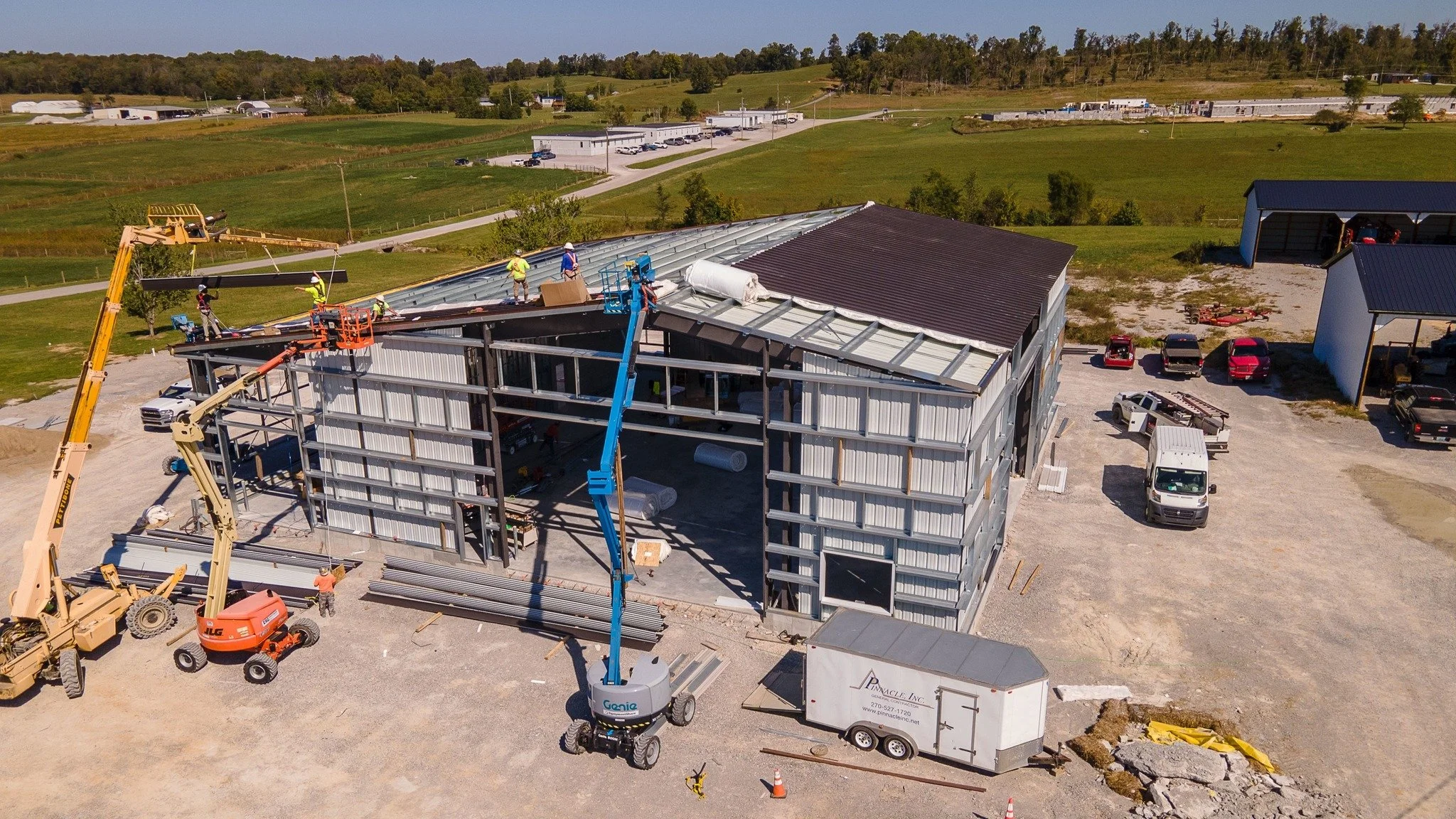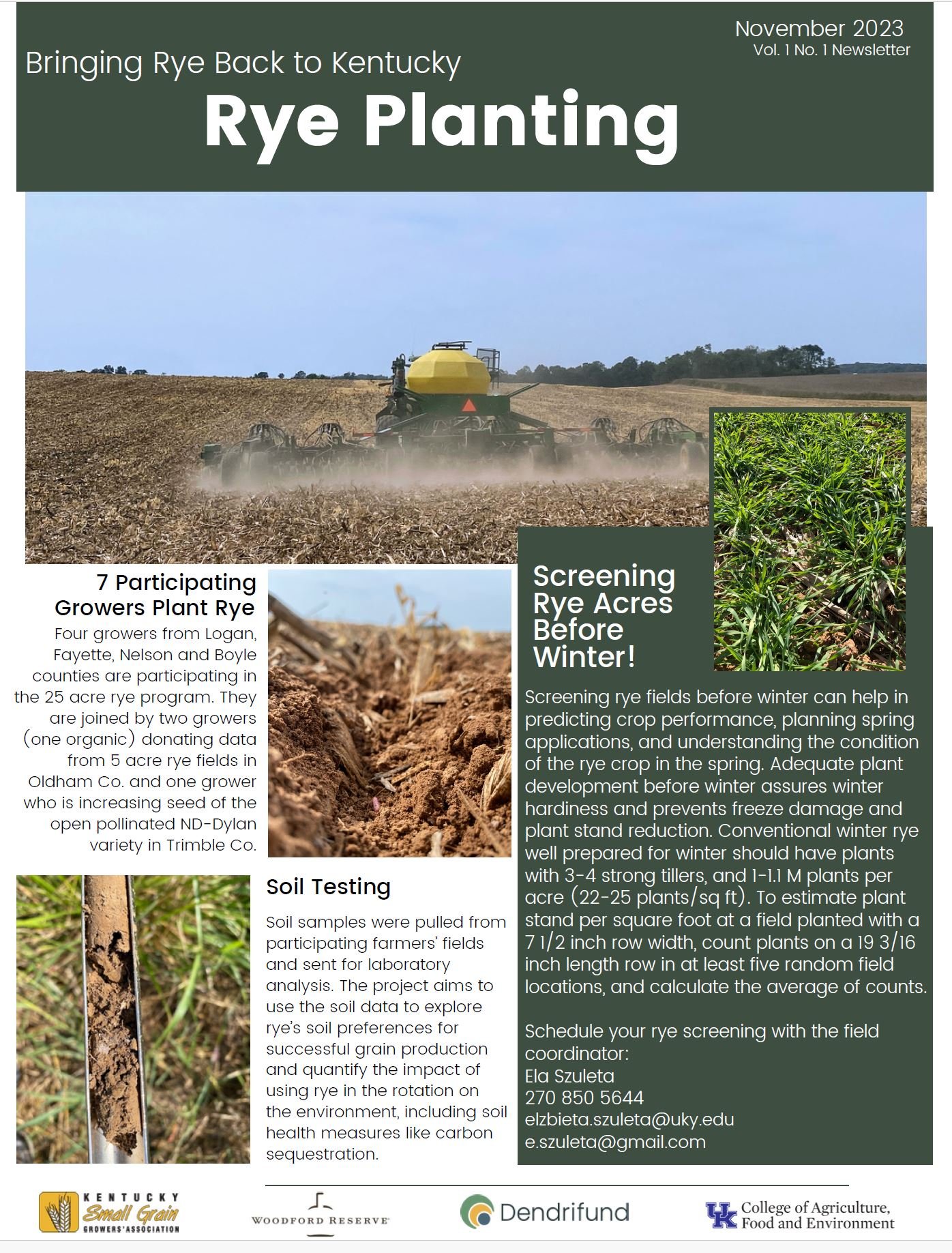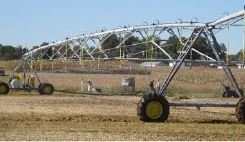On Dec. 11, 2021, an EF-4 tornado struck the University of Kentucky Research and Education Center at Princeton (UKREC), leaving behind only remnants of a facility that had been an essential contributor to Kentucky's agricultural research. Decades of infrastructure and millions of dollars in equipment were destroyed overnight, reducing one of the state’s key agricultural assets to rubble. Now, three years after the storm, the Western Kentucky center is rebuilding and becoming better than before.
Read MoreThe collaborative project “Bringing Rye Back to Kentucky” is up and running! Please find the inaugural rye newsletter, prepared by Dr. Ela Szuleta, our field coordinator.
Read MoreThe Kentucky Small Grain Growers selected research to fund earlier this year, bringing the total dedicated to wheat and small grain related research to $4 million in the past 30 years.
Read MoreThe University of Kentucky Wheat and Small Grains Variety Testing Program evaluates wheat and small grain (barley, cereal rye, oats, triticale, ancient grains) varieties that are commercially available or may soon be available to farmers. Annual variety performance testing provide farmers, seed producers, extension agents and consultants with current, unbiased information to help them select the varieties best adapted to their locality and individual requirements.
Read MoreIn an ongoing effort to bring production of rye grain back to Kentucky, Woodford Reserve today announced a five-year commitment to purchasing the grain from local farmers while working with the University of Kentucky to conduct research.
Read MoreRead the latest research report on managing Fusarium head blight (head scab) in wheat from the University of Kentucky. This research was conducted by Nathaniel White, Timothy Stombaugh, and Carl Bradley with funding from the Kentucky Small Grain Promotion Council. It was published in the Plant Health Progress research journal.
Read MoreA field study was grown in the harvest years 2021 and 2022 at Spindletop Farm (LEX) and the West Kentucky Research and Education Center (PRN). The overarching objective was to determine whether applications of sulfur fertilizer (S) in combination with various levels of N fertilizer would increase yield and N use efficiency.
Read MoreWheat has not been known as a chief commodity in Kentucky due to higher production challenges when compared to corn and soybeans, but I’d encourage you to take another look.
Read MoreThe Kentucky Small Grain Growers Association is now accepting research proposals for the 2023-2024 growing season. Projects should be geared towards the research of small grain crops (wheat, barley, oats, rye, rice, and triticale).
Read MoreWebster County grain farmers Bruce and Jeremy Benson have been named the 2023 University of Kentucky Wheat Science Group’s Service Award recipients.
Read MoreFulton County grain farmer Henry Sanger is the 2022 recipient of the University of Kentucky Wheat Science Group’s Service Award.
Read MoreWe will build again at Princeton. Our commitment to western Kentucky and the entire region remains. The Category EF-4 tornado on December 10, 2021 damaged 49 of the 59 structures at the Research and Education Center.
Read MoreAn initiative to bring rye back to Kentucky is underway but more help is needed from local distilleries.
Read MoreA University of Kentucky research project that could have significant impacts for Kentucky grain producers with irrigated acres is beginning on a Western Kentucky farm. Ole Wendroth, soil physicist in the UK College of Agriculture, Food and Environment, is leading a study examining the effects of a variable rate irrigation system that, to his knowledge, is the first-of-its-kind in the state.
Read MoreIn 2017 two separate populations of Italian ryegrass from Kentucky were submitted to the University of Kentucky weed science program for screening of herbicide resistance. The two populations were screened for resistance in greenhouses at the University of Kentucky Research and Education Center in Princeton in the winter of 2017-2018.
Read MoreBarley yellow dwarf is one of the most devastating diseases in wheat worldwide. Here, we report the absence and presence of plants infected with BYDV or CYDV in commercial wheat fields in western Kentucky.
Read MoreCommercial winter wheat seed (cv Pioneer26R1A) without and with insecticide seed treatment (Poncho® (clothianidin)) were planted into no-till research plots of the University of Kentucky’s Research and Education Center in Princeton, KY.
Read MoreResearch by Tim Phillips at University of Kentucky.
Read MoreCereal rye is planted on more acres than any other cover crop species in the U.S. because it can reliably produce substantial biomass in a wide range of growing conditions. In order to maximize these benefits, well-adapted cereal rye cultivars should be selected for rapid and complete ground cover, high biomass production, and high potential to suppress weeds.
Read More


















